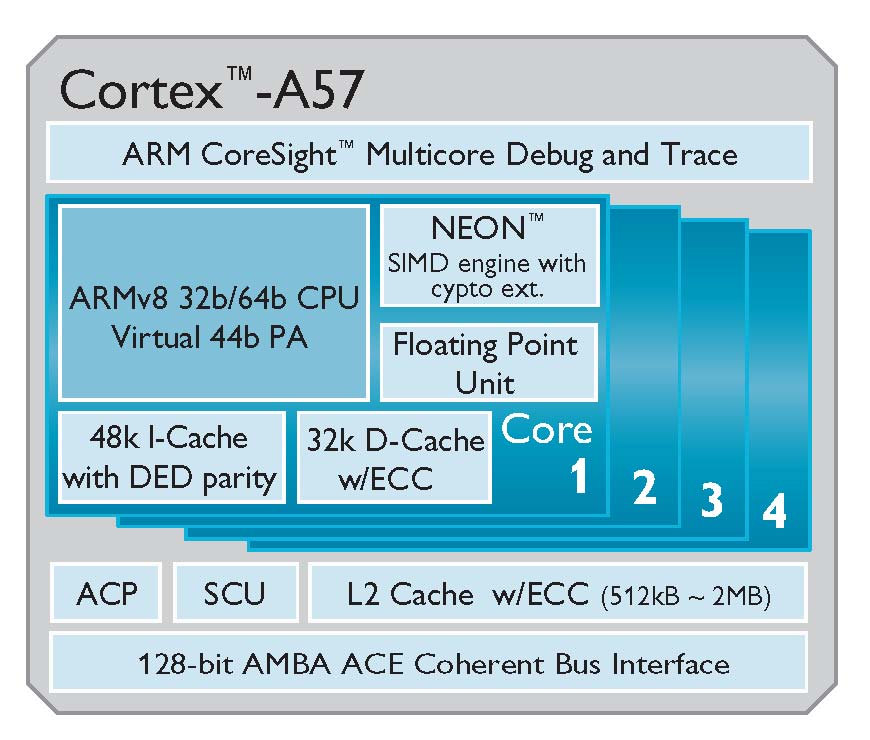ARM Announces Cortex-A50 64-Bit Processors
Scheduled for arrival in actual commercial SoC designs in 2014, ARM formally announced the first two processors based on it 64-bit ARMv8 architecture.
The Cortex-A50 series will initially debut as A53 and A57 with the latter moving closer to Intel territory and a claimed performance that is similar to a "legacy PC".
Leading up until 2014, Intel will not be standing still either; but if ARM can deliver on its promise that especially the flagship model A57 can triple the performance of the Cortex-A15 processor, the company is setting a lofty goal that expands the horizon what future smartphone and tablet will be able to do.
The big news is the arrival of 64-bit support in ARM's designs which is necessary to provide it with an opportunity to break into new markets of desktop computing as well as server computing. While the company is not aiming to challenge Intel's high-performing x86 Xeon processors, ARM vendors believe they have an opportunity to use lower power processors to offer an efficient alternative for all those tasks where a Xeon processor's processing capability is not granular enough and effectively wasted.
In ultradense microservers, which aim for application areas such as networking, storage and bulk processing tasks in cloud environments, ARM vendors believe they can make a compelling business case. Intel will be standing against ARM vendors with its Atom S processor series.
Initial licensees of ARMv8 include AMD, Broadcom, Calxeda, HiSilicon, Samsung and STMicroelectronics. AMD recently announced that it will be designing ARM processors in the future as well.
Contact Us for News Tips, Corrections and Feedback
Get Tom's Hardware's best news and in-depth reviews, straight to your inbox.

Wolfgang Gruener is an experienced professional in digital strategy and content, specializing in web strategy, content architecture, user experience, and applying AI in content operations within the insurtech industry. His previous roles include Director, Digital Strategy and Content Experience at American Eagle, Managing Editor at TG Daily, and contributing to publications like Tom's Guide and Tom's Hardware.
-
azraa What do they mean with 'Legacy PC' ? :SReply
I mean, this development is great, but Legacy PC could be what?
Something along the line of the first core 2 duo? similar to a 1st gen athlon64?
Anyway, props to ARM c: -
First core 2 duo is going to be challenged by the higher clocked versions of Cortex A15, which is already entering the market. Can't wait to see what they'll do with those shiny new toys :DReply
-
chewy1963 Reply9421985 said:What do they mean with 'Legacy PC' ? :S
I mean, this development is great, but Legacy PC could be what?
Something along the line of the first core 2 duo? similar to a 1st gen athlon64?
Anyway, props to ARM c:
Or they could mean an 8088 running at 4.77 MHz, that's about as "legacy" as it gets! :lol: -
esrever azraaWhat do they mean with 'Legacy PC' ? :SI mean, this development is great, but Legacy PC could be what?Something along the line of the first core 2 duo? similar to a 1st gen athlon64? Anyway, props to ARM c:legacy means instructions that are no longer used but are still supported for backward compatibility. Mostly in the x86 world it means the old x87 instructions and some of the intel instructions used in the first pentiums and such. The core 2 duo is positively modern compared to some of these instructions.Reply -
Good on AMD for moving away from x86. You can't possibly beat Intel at x86 because they control the licensing and IP, and if you do manage to beat them at anything, they'll just bribe the entire industry into shunning your advancements and refusing to sell your products, whilst simultaneously having the tech media slander your good name...Reply
By contrast, ARM is a level playing field that anybody can join, x86 is going to whither away into nothing, good riddance... -
southernshark Given the hype I suspect that the actual product will impress me just as much as AMD's Bulldozer did.Reply -
Well if ARM 64 can get the job done, I am sure it will cost less than Intel$ high cost silicon! I hope ARM continues to produce products the users can and do use for their computing needs, and AMD continues to build alternatives, or we will all be at Intel$ mercy!Reply
-
sykozis otacon72AMD lost because it's R&D department sucks and couldn't keep up. They were neck and neck with intel for a while until Core 2 blew AMD out of the water and they just went downhill from there. How you beat any company is come up with a better product and AMD couldn't.AMD's R&D department couldn't keep up because Intel used it's position to bride OEMs into refusing to use AMD products....and in Dell's case, offered rebates, brides and altered payment schedules. In cases where OEMs refused to drop AMD base products, Intel made threats. In Compaq's case....Intel decided to intentionally ship an order of Xeon processors late because Compaq refused to drop their AMD based product lines.Reply
Do a little research. This has all been proven. -
shqtth AMD got a billion, they could of caught up, but they spend all that money for beer for investors.Reply
